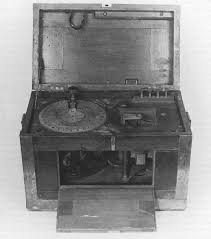 |
| A Civil War telegraph. |
WASHINGTON, D. C., February 21, 1862-12.30 a.m.
General G. W. CULLUM, Cairo:
Gun and mortar boats must be ready in much less than ten days. Call on Chicago for assistance; we cannot now stand on forms. From two to four gunboats and a few mortar boats would secure evacuation of Columbus. You need have no fear for Cairo if you have a respectable garrison there. The enemy will not attack you.
Ten days to prepare boats is inadmissible; they must be ready by Monday, if you have to take the affair in charge yourself.
GEO. B. McCLELLAN,
Major-General, Commanding U. S. Army.
WASHINGTON, D. C., February 21, 1862-12.30 a.m.
Major-General HALLECK, Saint Louis:
Buell at Bowling Green knows more of the state of affairs than you at Saint Louis. Until I hear from him I cannot see necessity of giving you entire command.
I expect to hear from Buell in a few minutes. I do not yet see that Buell cannot control his own line. I shall not lay your request before the Secretary until I hear definitely from Buell.
GEO. B. McCLELLAN.
WASHINGTON, D. C., February 21, 1862-1 a.m.
General BUELL:
Telegraph me at least once every day the position of your own troops, that of the rebels, and the state of affairs. Unless I have this detailed information I cannot tell whether it is necessary or not to suspend or abandon my own plans here. Neither Halleck nor yourself give me as much detailed information as is necessary for me. This is the critical period, and I must be constantly informed of the condition of your affairs.
GEO. B. McCLELLAN.
(Similar dispatch, same date, to Halleck.)
WASHINGTON, D. C., February 21-7.30 p.m.
Major General H. W. HALLECK, Saint Louis, Mo.:
I think you are entirely right in not wishing to push Curtis beyond Bentonville. No necessity for anything more than a party of cavalry at Fayetteville. The true line of advance into Arkansas is by Pocahontas and Jacksonport; there you seriously threaten Memphis. To-morrow I shall hear definitely from Buell what he can do. I think our next move must be on Nashville with least possible delay. As soon as we can move a column on Humboldt or vicinity Columbus will fall. Hurry repairs of gunboats; work on them day and night. As soon as enough of them are ready to protect mortar boats send latter to shell Columbus.
GEO. B. McCLELLAN,
Major-General, Commanding U. S. Army.
WASHINGTON, D. C., February 21, 1862-9.30 p.m.
General BUELL:
T he advance on Nashville is of the greatest importance. If you can make it by the line of the Cumberland more rapidly than by Bowling Green at once change your line of operations, and I will direct Halleck's troops on Memphis and Columbus.
What is Thomas' division doing at Bardstown? Rapid movements are now necessary. If railroad to Nashville is destroyed, take the line of Cumberland River. I repeat, both Halleck and yourself keep me to much in the dark. Your reports are not sufficiently numerous or explicit.
GEO. B. McCLELLAN.
WASHINGTON, D. C., February 21, 1862
General HALLECK:
What more have you from Columbus? You do not report either often or fully enough. Unless you keep me fully advised, you must not expect me to abandon my own plans for yours.
GEO. B. McCLELLAN.
WASHINGTON, February 21, 1862
J. B. FRY, Assistant Adjutant-General, Louisville:
It will be better for all concerned if you will keep us fully advised about matters in Kentucky. The general is embarrassed all the time for want of definite information from both Generals Halleck and Buell. Your dispatch of to-day was more definite than any yet received from either party since they left Washington. This is strictly private.
A. V. COLBURN.
BOWLING GREEN, February 21, 1862
General HALLECK, Saint Louis:
I shall start from here to-morrow and expect to be opposite or near Nashville to-morrow night. Move up the river with your gunboats, but without exposing them unnecessarily.
D. C. BUELL,
Brigadier-General.
Official Records, Series I., Vol. 7, Part 1, Page 645.
This was America's first modern war. The telegraph allowed McClellan in Washington access to real time information from the field. Unfortunately for him, neither Halleck nor Buell was very forthcoming with information. McClellan was pressing for an advance on Nashville to exploit the advantage gained at Forts Henry and Donelson. The center of the Confederate line had been penetrated and Tennessee lay open to attack. Johnston was falling back in disorder. Halleck was reluctant to move on Nashville without naval support, which would be delayed until the damaged gunboats from Donelson could be repaired. Opportunity was the Union's, if McClellan could get Halleck and Buell to act in concert.
Official Records, Series